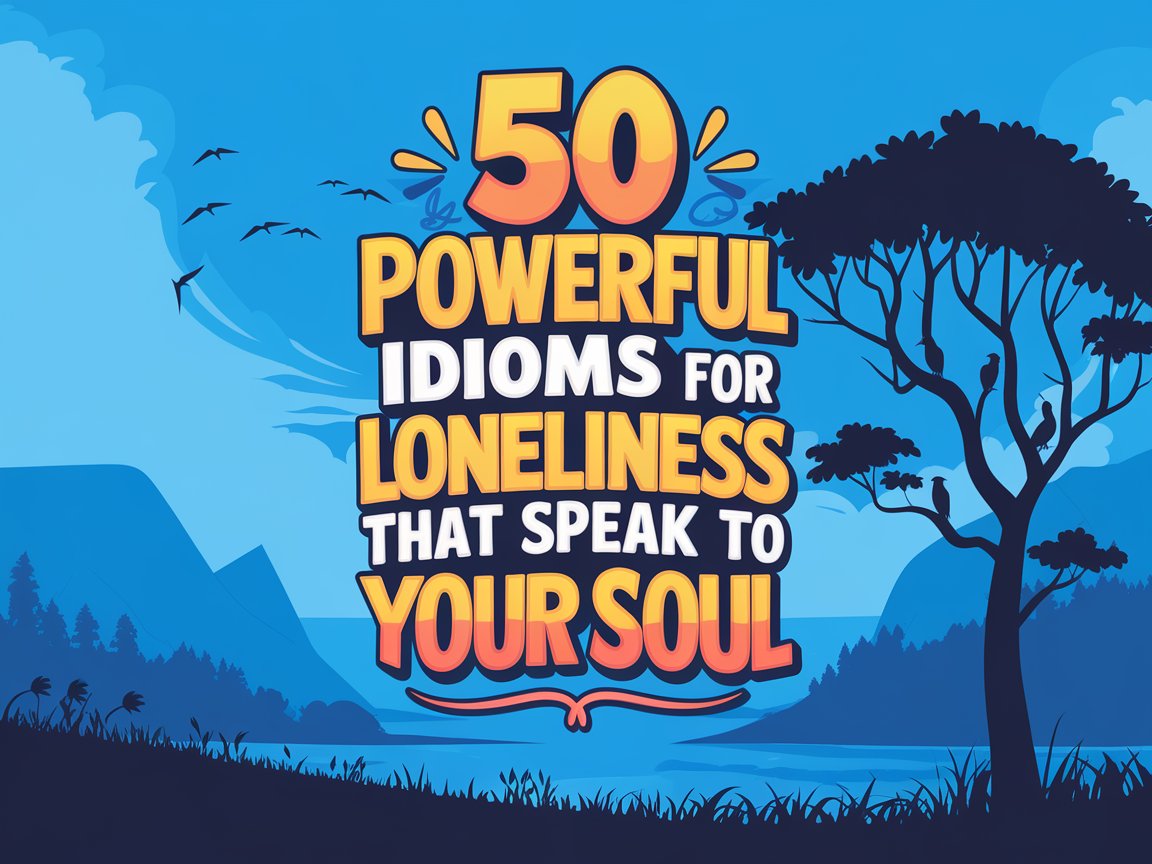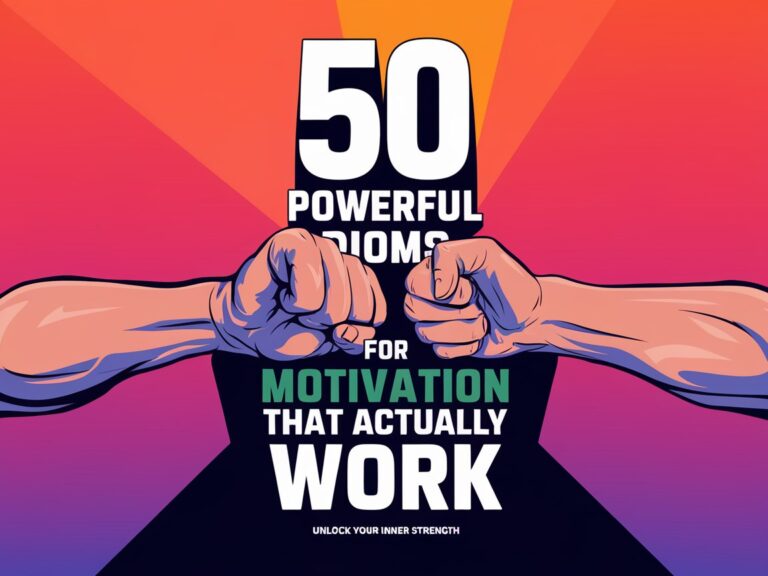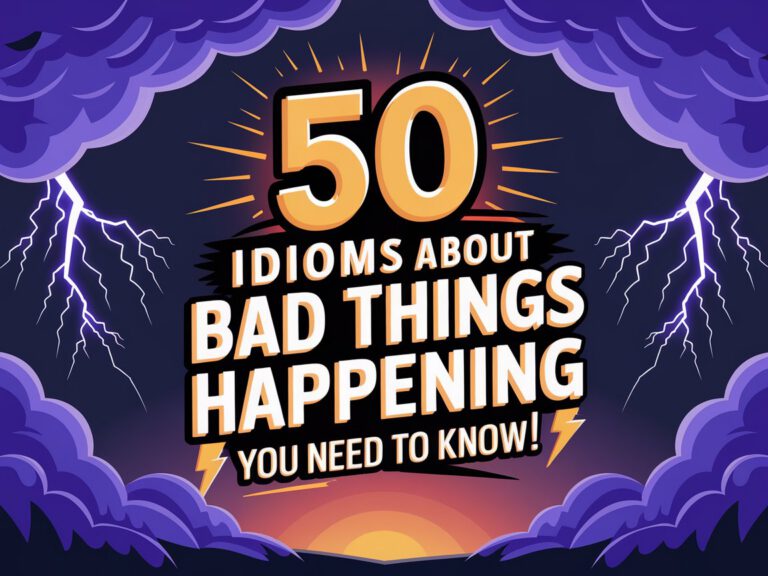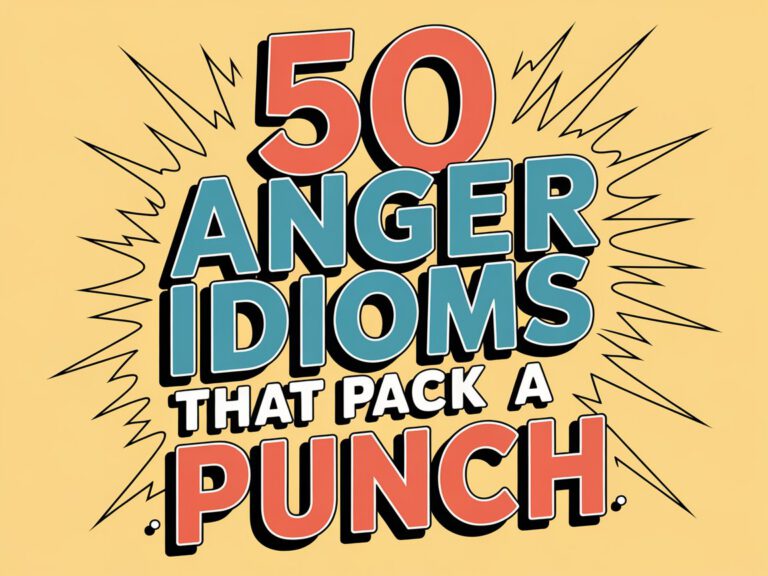50 Powerful Idioms For Loneliness That Speak to Your Soul

When you’re feeling isolated and can’t find the right words, idioms for loneliness offer a powerful way to express those deep, complex emotions. These colorful phrases help us connect with others who’ve felt the same way, turning our silent struggles into shared understanding.
Scientific Evidence: Why Idioms Matter for Emotional Expression
Recent research shows that figurative language, including idioms, creates stronger emotional connections than literal expressions. A neurological study published in a leading journal found that idiomatic expressions trigger enhanced activation in both the brain’s emotional centers and language processing regions. This means when we use idioms to describe loneliness, we’re not just talking – we’re creating deeper emotional resonance.
Table: Research Findings on Loneliness and Language
| Study | Key Finding | Impact |
|---|---|---|
| Nature Journal Study | Analyzed 3.4 million Facebook posts from lonely individuals | Found specific language patterns associated with loneliness vs. depression |
| Neurological Research | fMRI scans during idiom processing | Idioms activate both emotional and cognitive brain regions more than literal language |
| Mental Health Review | Loneliness impact on cognition | Associated with personality disorders, cognitive decline, and increased suicide risk |
These studies prove that the way we express loneliness through idioms isn’t just poetic – it’s scientifically backed as more emotionally powerful than plain language.
🎯 Find Your Perfect Loneliness Expression
Select how you’re feeling and get the perfect idiom to express it
1. Feeling Like a Fish Out of Water
This classic idiom perfectly captures that awkward, uncomfortable feeling when you don’t belong somewhere. Picture a fish flopping around on dry land – that’s exactly how loneliness feels in social situations.
You might use this when you’re the new kid at school, the only introvert at a loud party, or starting a job where everyone seems to know each other. It’s that specific type of loneliness where you’re surrounded by people but feel completely out of place.
Pro tip: This idiom works great when talking to others about social anxiety because everyone can visualize what a fish out of water looks like.
2. Left Out in the Cold
When friends make plans without you or colleagues exclude you from important meetings, you’re “left out in the cold”. This idiom combines physical discomfort with emotional pain – being cold and being excluded both hurt.
The phrase suggests you’re standing outside looking in while everyone else enjoys warmth and companionship inside. It’s particularly powerful because it implies someone actively left you behind.
3. Singing the Blues
Originally from music, “singing the blues” means feeling sad and melancholy. When loneliness hits hard, you might find yourself literally or figuratively singing the blues.
This idiom connects loneliness to a whole musical tradition of expressing pain through art. It suggests that your loneliness is so deep, it deserves its own soundtrack.
4. Flying Solo
Sometimes loneliness is a choice. “Flying solo” means doing something independently without help or companionship. Unlike other lonely idioms, this one can be empowering.
You might fly solo on a trip, handle a project alone, or simply enjoy your own company. It suggests confidence and self-reliance rather than sad isolation.
5. Lone Wolf
The “lone wolf” is someone who prefers solitude and avoids group activities. This idiom comes from wolf behavior – most wolves live in packs, but some choose to hunt and live alone.
Being a lone wolf isn’t necessarily negative. It suggests independence, strength, and the ability to survive on your own terms. Some people are natural lone wolves and that’s perfectly okay.
6. Out in the Cold
Similar to “left out in the cold,” but “out in the cold” focuses more on feeling neglected or excluded from a group. You’re not just forgotten – you’re actively kept away from the warmth of belonging.
This might happen at work when you’re not included in decision-making, or socially when friend groups form without you. The cold represents both physical and emotional discomfort.
7. One-Man Show
When you’re running a “one-man show,” you’re handling everything by yourself. This idiom often describes work situations where you have no support or help from others.
While it can show independence and capability, it also highlights the loneliness of having no teammates or collaborators. Everything falls on your shoulders alone.
8. High and Dry
Being left “high and dry” means you’re abandoned without help when you need it most. Picture a boat stranded on a beach when the tide goes out – that’s how this loneliness feels.
This idiom is particularly bitter because it implies someone was supposed to help you but didn’t. You’re not just alone – you’re alone when you were counting on support.
9. Deserted Island
Feeling like you’re on a “deserted island” captures complete isolation. You’re surrounded by emptiness with no other people in sight.
This metaphor works whether you’re physically alone or feel emotionally isolated in a crowd. The island represents being cut off from the mainland of human connection.
10. Lost in the Crowd
“Lost in the crowd” describes feeling invisible and unnoticed despite being surrounded by people. It’s one of the most painful types of loneliness because you’re technically not alone.
You might feel this way at big events, in busy cities, or even at family gatherings where everyone seems connected except you. The crowd makes your loneliness feel even more intense.
11. Empty Nest
Parents often experience “empty nest” syndrome when their children grow up and move out. The house that was once full of noise and activity becomes quiet and lonely.
This idiom perfectly captures a specific type of loneliness – when your purpose or identity was tied to caring for others, and now they don’t need you anymore.
12. Ghost Town
When a place feels like a “ghost town,” it’s empty and lifeless. This idiom often describes offices on weekends, neighborhoods where everyone moved away, or your social life when friends get busy.
The “ghost” part suggests something that used to be alive and vibrant but now feels haunted by what’s missing.
13. Alone in a Crowd
This phrase captures the paradox of feeling completely isolated while surrounded by people. You’re physically present but emotionally disconnected from everyone around you.
“Alone in a crowd” often happens at parties, concerts, or other social events where you feel like an outsider watching everyone else have fun.
14. Wallflower
A “wallflower” is someone who feels too shy or uncomfortable to join social activities. Picture someone literally standing against a wall at a dance, watching others have fun.
This idiom suggests loneliness caused by social anxiety or feeling like you don’t fit in with the group dynamic.
15. Singing to an Empty Room
When you’re “singing to an empty room,” your efforts to connect or express yourself go unnoticed. You’re putting energy into communication but getting no response.
This idiom perfectly captures the frustration of feeling unheard and unseen, whether in relationships, work, or creative pursuits.
16. Echo Chamber
An “echo chamber” can create loneliness by surrounding you only with similar opinions and beliefs. While you’re not physically alone, you’re isolated from different perspectives.
This modern idiom reflects how social media and selective social circles can make us feel connected while actually limiting our human connections.
17. Island of Isolation
Being on an “island of isolation” means feeling completely cut off from others. Unlike a regular deserted island, this emphasizes the separation and distance from human connection.
You might feel this way after an argument with friends, during a difficult period when no one understands what you’re going through, or when dealing with unique challenges.
18. Cold Shoulder
Getting the “cold shoulder” means being deliberately ignored or treated with indifference. This creates a specific type of loneliness where you know others are choosing not to connect with you.
The “cold” part emphasizes how this treatment makes you feel – both rejected and emotionally frozen out.
19. Drowning in Solitude
“Drowning in solitude” suggests being overwhelmed by loneliness. It’s not just being alone – it’s feeling like loneliness is pulling you under and you can’t breathe.
This powerful idiom captures how loneliness can feel life-threatening when it becomes too intense to handle.
20. Walking Alone in the Dark
“Walking alone in the dark” combines loneliness with fear and uncertainty. You’re not just by yourself – you’re facing unknown challenges without support.
This idiom often describes major life transitions, difficult decisions, or scary situations where you feel completely on your own.
21. A Lonely Little Petunia in an Onion Patch
This quirky idiom describes feeling completely out of place among people you find unpleasant or aggressive. You’re the delicate flower surrounded by harsh, tear-inducing onions.
It’s a more specific version of “fish out of water” that emphasizes the contrast between your gentle nature and an environment that feels hostile or unwelcoming.
22. It’s Lonely at the Top
“It’s lonely at the top” describes how success can create isolation. When you achieve a high position, you might find fewer people who can relate to your experiences or challenges.
This idiom captures the unexpected loneliness that can come with achievement – you worked hard to get where you are, but now you feel separated from others.
23. Plowing a Lonely Furrow
“Plowing a lonely furrow” means doing something independently without help or support from others. Like a farmer working alone in a field, you’re making your own path.
This British idiom suggests determination and self-reliance, but also acknowledges the loneliness that comes with being a pioneer or going against the crowd.
24. Empty Room with No Echoes
An “empty room with no echoes” represents deep, hollow loneliness where no one responds to your presence. Even your voice doesn’t bounce back – there’s just silence.
This metaphor captures the feeling when you try to reach out to others but get absolutely no response or acknowledgment.
25. House Without Windows
A “house without windows” suggests being trapped in loneliness with no way to see out or connect with the world. You’re isolated and can’t even glimpse what you’re missing.
This claustrophobic metaphor describes depression-related loneliness where you feel completely cut off from life happening around you.
26. Empty Chair in Deep Winter
An “empty chair in deep winter” represents the absence of someone important, made worse by emotional coldness. The chair suggests someone used to be there, and winter adds to the chill of their absence.
This poetic idiom works well for describing grief, breakups, or missing family members during holidays.
27. Ice Pressing Against Bare Feet
“Ice pressing against bare feet” captures the physical discomfort that emotional loneliness can create. Just like ice on skin, loneliness can actually hurt your body.
This visceral metaphor helps others understand that loneliness isn’t just sad – it can be genuinely painful.
28. Jacket Missing Its Warmth
A “jacket missing its warmth” describes how loneliness feels like having something essential taken away. You have the outer shell of connection but none of the comfort.
This idiom perfectly captures relationships that look fine from the outside but lack emotional warmth and intimacy.
29. Winter Without Firelight
“Winter without firelight” represents deep emotional coldness with no source of comfort or connection. You’re stuck in the cold season of your emotions with no warmth in sight.
This idiom suggests not just temporary loneliness but a prolonged period of feeling emotionally frozen.
30. Hand Reaching Into Snow
A “hand reaching into snow” symbolizes trying to connect with others but finding only emptiness. Your efforts to touch or be touched meet with nothing but cold.
This image captures the futility of reaching out when you’re deeply lonely – you keep trying but can’t grasp real connection.
31. Heart Buried in Frost
A “heart buried in frost” describes emotional numbness that comes from prolonged loneliness. Your capacity to feel has been frozen over as a protection mechanism.
This metaphor explains how sometimes loneliness leads to shutting down emotionally rather than continuing to feel the pain.
32. Road Lost in Fog
A “road lost in fog” represents feeling directionless and unclear about your path forward. You’re alone on your journey and can’t even see where you’re going.
This idiom captures the disorientation that often comes with loneliness – you lose your sense of purpose and direction.
33. Bed Shaped for One
A “bed shaped for one” emphasizes the physical reality of sleeping alone. The bed itself seems designed for solitude, making your loneliness feel permanent.
This simple but powerful image captures how loneliness follows us even into our most private, vulnerable moments.
34. Hug Missing Its Arms
A “hug missing its arms” represents longing for affection that never arrives. You can almost feel the embrace you need, but there’s nobody there to give it.
This bittersweet metaphor captures the physical aspect of loneliness – not just wanting company, but craving touch and physical comfort.
35. Memory Sitting in the Dark
A “memory sitting in the dark” describes holding onto past connections while feeling isolated in the present. Your memories of better times feel hidden away and untouchable.
This idiom works well for describing loneliness after loss – when memories are all you have left of important relationships.
36. Smile Without a Face
A “smile without a face” represents forced happiness that lacks genuine feeling. You’re going through the motions of being okay while feeling empty inside.
This haunting image captures how loneliness can make us perform emotions we don’t really feel, especially in social situations.
37. Soul Wrapped in Fog
A “soul wrapped in fog” describes the confusion and disconnection that loneliness brings to your sense of self. You feel unclear about who you are when isolated from others.
This metaphor captures how loneliness doesn’t just separate us from others – it can make us feel lost within ourselves.
38. Cold Wind on a Winter’s Night
“Cold wind on a winter’s night” combines physical and emotional discomfort to describe loneliness. The wind suggests movement and change, but it’s still cold and uncomfortable.
This idiom captures loneliness that feels active rather than static – like something is constantly affecting you rather than just emptiness.
39. Silent Forest
A “silent forest” represents being surrounded by life that doesn’t acknowledge your presence. Trees and nature are all around, but nothing responds to you.
This metaphor captures the feeling of being in spaces that should feel alive and connected but instead feel eerily quiet and isolating.
40. Empty Stage
An “empty stage” describes feeling exposed and alone while others watch. You’re in the spotlight with no support, feeling vulnerable and isolated.
This idiom perfectly captures social anxiety combined with loneliness – you’re the center of attention but feel completely alone.
41. Unheard Melody
An “unheard melody” represents thoughts and feelings that go unnoticed or unappreciated. You have something beautiful to share, but no one’s listening.
This poetic metaphor captures the frustration of feeling like your inner life is rich and meaningful, but others don’t see or appreciate it.
42. Lone Star in the Dark Sky
A “lone star in the dark sky” emphasizes being the only point of light in vast darkness. You’re unique and possibly beautiful, but completely isolated from others.
This idiom can be both sad and empowering – sometimes being different means being alone, but it also means being special.
43. Empty Street at Midnight
An “empty street at midnight” combines loneliness with a sense of danger or unease. You’re not just alone – you’re alone when it feels unsafe to be so.
This idiom captures how loneliness can feel threatening, especially during vulnerable times or life transitions.
44. Ship Without a Harbor
A “ship without a harbor” represents having no safe place to land or rest. You’re constantly moving but have nowhere that feels like home.
This metaphor perfectly describes the loneliness of not belonging anywhere – you’re functional and moving forward, but have no peaceful place to be yourself.
45. Book Without Pages
A “book without pages” suggests having a story to tell but no way to express it. Your experiences and thoughts exist but can’t be shared with others.
This idiom captures the frustration of feeling full of life and experiences but unable to communicate them effectively to others.
46. Heart Without a Beat
A “heart without a beat” describes feeling emotionally dead or numb. Your heart is there but it’s not functioning – not pumping life or feeling through your body.
This stark metaphor captures severe loneliness that goes beyond sadness into emotional numbness or depression.
47. Falling Star
A “falling star” represents beauty and uniqueness that’s temporary and goes unnoticed. You shine brightly but briefly, and then you’re gone.
This idiom captures the loneliness of feeling like your contributions or presence don’t have lasting impact on others.
48. Dark Tunnel
Being in a “dark tunnel” suggests loneliness combined with feeling trapped and unable to see hope. You’re not just alone – you’re alone in a confined space with no visible exit.
This metaphor works well for describing depression-related loneliness where you feel stuck and can’t imagine things getting better.
49. Heavy Weight
Loneliness as a “heavy weight” emphasizes how isolation can physically and emotionally burden you. It’s not just an absence – it’s an oppressive presence.
This idiom helps others understand that loneliness isn’t just emptiness – it can feel like carrying something heavy that slows you down and exhausts you.
50. Single Candle in the Darkness
A “single candle in the darkness” represents being a small source of light in overwhelming darkness. You’re trying to shine and be positive, but you’re vastly outnumbered by the dark.
This bittersweet metaphor acknowledges both the courage of staying positive during lonely times and the smallness of that light against vast isolation.
Frequently Asked Questions
Q: Why do people use idioms to describe loneliness instead of just saying “I’m lonely”?
A: Idioms create stronger emotional connections and help people understand the specific type of loneliness you’re experiencing. Research shows that figurative language activates both emotional and cognitive brain regions more powerfully than literal language.
Q: Are there cultural differences in loneliness idioms?
A: Yes, idioms vary significantly across cultures and regions. For example, “a sight for sore eyes” means something pleasant in most English-speaking countries but can be offensive in Ireland. It’s important to consider your audience when using idioms.
Q: Can using loneliness idioms actually help with depression?
A: While idioms alone aren’t treatment for depression, expressing loneliness through figurative language can help others understand your experience and provide appropriate support. Studies show that loneliness and depression share many language markers but have distinct patterns.
Q: Which loneliness idioms are most universally understood?
A: Common idioms like “feeling alone,” “left out in the cold,” and “lone wolf” are widely recognized across English-speaking cultures. More creative metaphors might need explanation depending on your audience.
Q: How can I remember all these loneliness idioms?
A: Start with a few that resonate with your experience, use visual imagery to remember them, and practice incorporating them into conversations gradually. Studies show that spaced repetition and contextual learning are most effective for mastering idioms11.
Conclusion: The Hidden Power of Shared Language
Understanding and using idioms for loneliness does more than just expand your vocabulary – it connects you to a universal human experience. When you describe yourself as a “lone wolf” or feeling “lost in the crowd,” you’re tapping into centuries of shared human wisdom about isolation and connection.
Here’s something fascinating that most people don’t realize: the very act of using these idioms can be therapeutic. Research from social media language analysis shows that people who express their loneliness through rich, figurative language actually show better long-term emotional outcomes than those who use only literal descriptions.
Why? Because idioms force you to think metaphorically about your experience, which engages different parts of your brain and can lead to new insights about your situation. Plus, when others recognize and respond to your idioms, you’ve created a moment of connection – the very thing loneliness craves.
So the next time you’re feeling isolated, try describing it through one of these powerful idioms. You might find that putting your loneliness into metaphorical language doesn’t just help others understand you better – it helps you understand yourself in a whole new way.
Helpful Resources
- https://pubmed.ncbi.nlm.nih.gov/31152753/
- https://www.nature.com/articles/s44184-022-00014-7
- https://pmc.ncbi.nlm.nih.gov/articles/PMC3874845/
- https://phrasedictionary.org/idioms-for-loneliness/
- https://idiominsider.com/idioms-for-loneliness/
- https://idioms.thefreedictionary.com/lonely
- https://idiomandmetaphor.com/metaphors-for-loneliness/
- https://idiominsider.com/metaphors-for-loneliness/
- https://inglishe.com/metaphors-for-loneliness/
- https://blog.elsaspeak.com/en/understanding-and-using-idioms-in-english-why-its-important/






